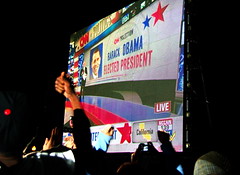 Image by jvoves via Flickr
Image by jvoves via Flickr
WASHINGTON (AP) -- President Barack Obama's willingness to consider alternatives to medical malpractice lawsuits is providing a boost for taking such cases out of the courtroom and letting experts, not juries, decide their merits.
The idea of appointing neutral experts to sift malpractice facts from allegations appeals to conservatives in both political parties. They want to address medical liability as part of health care legislation that's now largely silent on the issue. Trial lawyers remain steadfastly opposed to curbs.
Nonetheless, the American Hospital Association has been shopping a new plan to lawmakers, hoping it will be considered during Senate floor debate on health care in the coming weeks.
Separately, at a Health and Human Services hearing next week, proponents of the idea will urge the administration to provide funds for a pilot program. Obama has set aside $25 million to test a range of alternatives to malpractice litigation, and the hearing is the first step in deciding how to distribute it.
"There is a progressive opportunity here to leapfrog what has been a stereotypically polarized debate in Washington," said Will Marshall, president of the Progressive Policy Institute, a centrist Democratic think tank. "This serves both progressive and conservative goals. You wouldn't have to have a terrible injury and attract an enterprising malpractice lawyer to have access to court. And it would reduce malpractice premiums."
Doctors have maintained for years that fear of being sued leads them to order unneeded tests that raise costs for everyone. In Obama, they've found a Democratic president who accepts that premise.
Validation has als! o come f rom the Congressional Budget Office. In a turnaround, it recently concluded that malpractice curbs would lower the federal deficit by $54 billion over 10 years, mainly because Medicare and Medicaid wouldn't have to pay as much for defensive medicine.
What Obama doesn't accept is the idea of slapping hard limits on jury awards in malpractice cases, the remedy long advocated by doctors' groups. So the search is on for alternatives.
That's what Richard Umbdenstock, president of the hospital association, says his industry has come up with. "We are trying to offer this as a constructive approach, to see if we can generate some interest," he said.
Under the plan, patients who've suffered an injury at the hands of a medical professional or institution could take their case to a local panel of experts appointed by state authorities.
The patient wouldn't have to prove negligence, only that the doctor could have avoided the problem by following established guidelines for clinical practice.
If the experts find that a patient was harmed and the injury could have been avoided, the panel would offer compensation. Payments would not be open-ended, but based on a publicly available compensation schedule.
A patient who disagrees with the local panel's ruling could appeal to a higher-level panel, and ultimately, to a court.
The hospitals' proposal is similar to an idea for "health courts" from Common Good, a nonprofit group that advocates for changes in the legal system. All patients would benefit from such a system because it would create an incentive for doctors to follow clinical best practice guidelines, said lawyer Philip Howard, the group's founder.
It would also protect doctors who adhere to the standards, getting at the root of the problem of defensive medicine.
"Defensive medicine is! the res ult of distrust by doctors in situations where they are blamed when a sick person get sicker, but they didn't do anything wrong," said Howard.
But trial lawyers say that such an approach could infringe on constitutional rights.
"We think that health courts take away the right to a jury trial," said Susan Steinman, policy director for the American Association for Justice, which represents lawyers.
It's unlikely that Congress would pass a law ordering states to adopt health courts. For one thing, trial lawyers are among the biggest contributors to Democratic candidates. But Harvard law and public health professor Michelle Mello says the federal government could encourage states to adopt such changes themselves, by offering financial grants. Sen. Mike Enzi, R-Wyo., an influential voice on health care, has advocated such an approach.
The Obama administration is keeping all its options open. A stronger medical malpractice initiative could help the health care bill get votes from moderates and conservatives. It could also alienate some liberals. The political balance is unclear.
HHS spokesman Nick Papas said any proposal that advances the president's goals of protecting patients, reducing frivolous lawsuits, fairly and quickly compensating patients who are injured, and fostering more open communication between doctors and patients will be considered for funds under the administration's $25 million pilot program.
"Medical malpractice reform is a hand extended to the Republicans," said Marshall, the Democratic centrist. "But there's no telling if they might swat it away."







